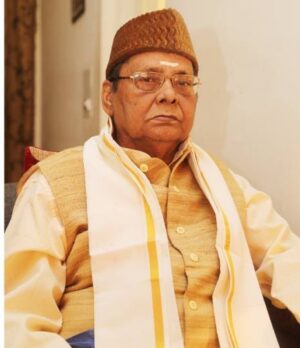Obituary: In Reverent Memory of Acharya Nishant Ketu
By – Dr. Birbal Jha
A Tribute to a Timeless Scholar, Literary Luminary, and Spiritual Thinker
It is with profound grief and heartfelt respect that I, Dr. Birbal Jha, mourn the passing of Acharya Nishant Ketu, a towering figure in Indian literature and scholarship. He left for his heavenly abode on Sunday, August 17, 2025, in Gurugram, at the venerable age of 90. With his departure, the world of letters has lost a rare genius—one whose light illuminated the corridors of literature, linguistics, philosophy, and spirituality.

Born as Chandrakishor Pandey, Acharya Nishant Ketu was much more than a name; he was a legacy. A scholar of remarkable depth, a literary craftsman par excellence, and a spiritual seeker rooted in tradition yet forward-thinking in outlook, he spent his life in pursuit of knowledge, truth, and cultural advancement.
A Stalwart of Hindi Literature
Over a prolific literary career spanning six decades, Acharya Nishant Ketu authored and edited more than 100 distinguished works, contributing richly to poetry, fiction, essays, memoirs, grammar, philosophy, and spiritual literature. His celebrated story collections—“Dard ka Dayra,” “Aakhri Hansi,” “Maati Teela,” and “Teesre Aadmi ki Shinakht”—continue to resonate deeply with readers across generations.
His work bridged the divide between tradition and modernity, crafting a unique voice that spoke to the timelessness of Indian thought while embracing the evolving spirit of contemporary discourse. His stories have rightfully found their place in Bihar’s secondary school curriculum, sowing the seeds of literary appreciation among young minds.
A Life in Academia and Service to Knowledge
For nearly four decades, from 1960 to 1997, Acharya Nishant Ketu served in the Department of Hindi at Patna University, ascending through the roles of professor, reader, and ultimately head of the department. He was a beacon of inspiration to students and colleagues alike, fostering a love for the Hindi language and the deeper currents of Indian culture.
His scholarly prowess knew no linguistic boundaries. Fluent in Hindi, Sanskrit, English, Bengali, Tamil, and Telugu, he brought a rare cross-cultural and pan-Indian perspective to his academic and literary endeavors.
A Polymath and Spiritual Sage
What set Acharya Nishant Ketu apart was not only the breadth of his knowledge but the depth of his insight. His writings delved into diverse disciplines—linguistics, lexicography, grammar, astrology, tantra, yoga, sociology, and philosophy. His mastery of esoteric subjects like Akshara Tattva, Tantric Vinyoga, Layayoga, Antah Suryavigyan, Rudraksha Dharan, Japayoga, and Navayurvigyan placed him in the league of rare scholar-saints who combined intellect with inner realization.
He was especially revered for his profound understanding of Rahu and Ketu in Vedic astrology, a subject on which he wrote and spoke with unmatched clarity and insight.
A Voice of Integrity and Cultural Unity
In his lifetime, Acharya Nishant Ketu remained a vocal critic of regionalism and casteism that plagued certain literary and social spaces. His fearless commitment to intellectual honesty and social harmony earned him the admiration of both peers and readers. In the literary gatherings of Delhi and beyond, his presence was both commanding and comforting.
Honours and Enduring Legacy
In recognition of his contributions to Hindi literature, he was conferred the prestigious Sahitya Bhushan Samman by the Uttar Pradesh Hindi Sansthan in 2017, among many accolades received during his lifetime. His name now adorns the “Acharya Nishant Ketu Adhyayan Kaksh” at Magadh University, Bodh Gaya—an enduring homage to his scholarship.
His published works, such as “Jism Ke Chhilake,” “Vyavharik Hindi Vyakaran,” “Rati-Shringara Aur Sannyas-Saar,” “Pragyan Purush,” and “Sugam Tantragam,” remain widely available and continue to influence scholars, students, and spiritual seekers alike.
A Personal Note of Remembrance
To me personally, Acharya Nishant Ketu was not just a scholar to admire, but a soul to revere—a guiding light for all of us committed to preserving and promoting the richness of Indian language and culture. His passing is an irreplaceable loss, but his ideas, ideals, and insights will continue to inspire and guide countless lives.
Let us honour him not with mourning alone, but by living the values he upheld: scholarship with humility, intellect with intuition, and knowledge with compassion.
May his soul attain the ultimate liberation he so often wrote of, and may his legacy shine eternally as a beacon for seekers of truth. Om Shanti.
